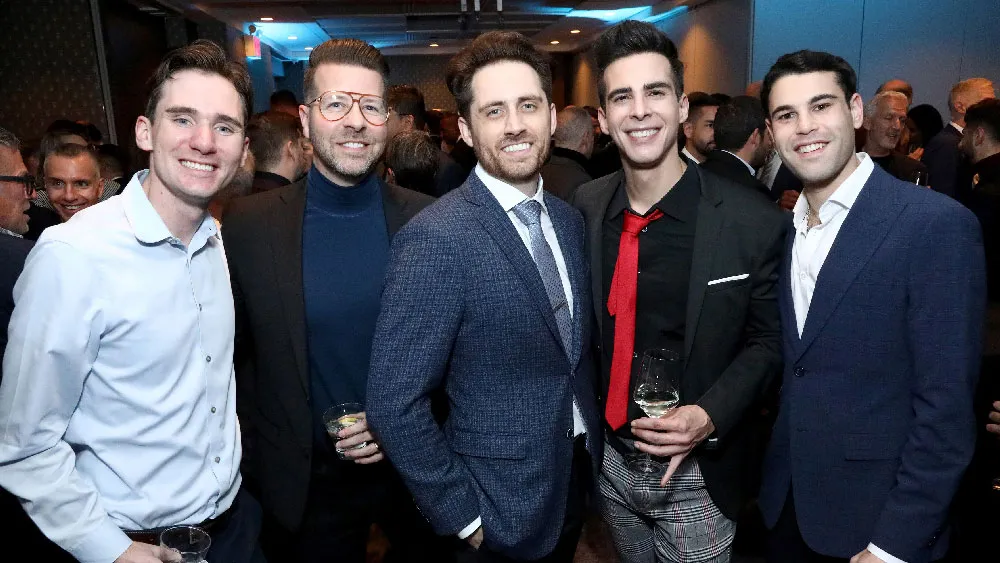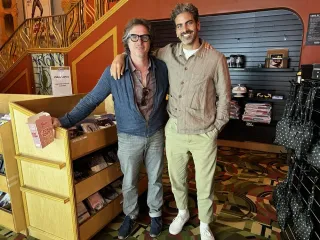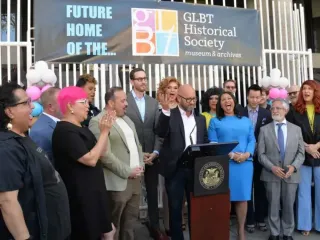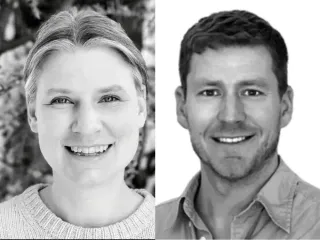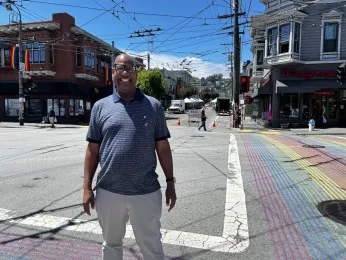
Aug 20
Political Notebook: Gay Minneapolis mayoral candidate DeWayne Davis stumps in Bay Area
Matthew S. Bajko READ TIME: 8 MIN.
During a Bay Area trip with his husband to mark their 34th anniversary with friends, the Reverend Dr. DeWayne Davis mixed in some politicking amid the personal celebrations. The gay Democrat is seeking to be elected the first out mayor of Minneapolis come November 4.
Should he do so, the African American leader and former congressional aide would be one of the highest-ranking LGBTQ political leaders in the Midwest and one of a handful of out Black male mayors elected in the U.S. Backing his candidacy is the LGBTQ+ Victory Fund, which works to elect out candidates across the country and is now led by gay former California assemblymember Evan Low.
“Minneapolis is uniquely situated to weather whatever the current federal administration throws at us. I think we can be a model for other cities on how to be vigilant for your citizens, how to bolster morale and how to be fighting back,” Davis told the Bay Area Reporter when asked about the importance of his being his city’s first out mayor.
Low called Davis “a changemaking leader for Minneapolis” who “will stand up for equality and vulnerable communities as mayor."
"Rev. Dr. DeWayne Davis brings the right mix of experience, compassion and perspective to the race for mayor of Minneapolis, and we are proud to endorse him in his history-making campaign,” Low told the B.A.R. “As a clergy member and a public servant, Rev. Dr. Davis is deeply connected to the city and its residents and will fight for solutions that work.”
Davis, 54, and his spouse, Kareem Murphy, 53, a deputy county administrator for Hennepin County, have long been friends with Alameda school board president Ryan LaLonde and his husband, Christopher Moody. They co-hosted a fundraiser for Davis August 16 at the gay-owned LGBTQ nightlife venue Fluid510 in downtown Oakland that attracted a bevy of out local leaders and others, netting more than $8,000 for Davis’ campaign coffers.
“He has been my husband’s and my best friend for 30 years. He is the person who will be executing our will if we were to die,” LaLonde told the B.A.R. “We have complete confidence in his ability to not only lead Minneapolis but find solutions for the city where everybody is sure they are the right thing to do right now.”
The day prior, the B.A.R. invited Davis to meet up for an interview about his candidacy in the cafe of the Castro Country Club, a nonprofit sober space in the heart of San Francisco’s LGBTQ district. A first-time candidate for elected office, Davis has emerged as a top contender alongside Mayor Jacob Frey, who is seeking a third four-year term, and state Senator Omar Fateh.
With the city and Frey still contending with the fallout from the murder of George Floyd by a white police officer in 2020, the election was already sure to draw national interest. Then came New York City mayoral contender Zohran Mamdani’s primary victory earlier this summer to be the Democratic Party’s candidate in his race. Comparisons between him and Fateh, being they’re both Muslims and Democratic socialists, ratcheted up the mainstream media’s coverage of the Minnesota race.
And as voters begin to pay more attention to the contest post the upcoming Labor Day weekend, the unofficial start to the fall campaign season during election cycles, attention on the contest to lead Minnesota’s largest city will only intensify. Having quietly launched his mayoral campaign last October, Davis resigned from his minister position in June in order to focus on his candidacy full-time.
“We feel really good about where we are,” said Davis about the state of the race to date.
A poll released in the spring had Frey’s disapproval as mayor at 50% and unfavorable rating at 51%. Just 28% had him as their first choice in the mayoral race, with Fateh at 15% and Davis at 10%. A plurality, at 44%, were unsure, while a third challenger, college adjunct professor and mediator Jazz Hampton, who is CEO and general counsel of tech company TurnSignl, polled at 4%.
The city will use ranked-choice voting to determine the winner, similar to how San Francisco and Oakland run their mayoral elections. Rather than have a runoff election if no candidate on the first ballot secures more than 50% of the vote, those with the least votes are eliminated and their voters’ ranked mayoral choices are then tabulated until a winner emerges with a majority of the vote.
Davis doesn’t have a ranked-choice strategy lined up with any of the other candidates. He sees himself as most likely to be the second choice for both Frey’s and Fateh’s supporters, giving him a pathway to victory.
“Myself, Senator Fateh, and Jazz represent a majority of voters or likely voters who want new leadership,” contended Davis, who co-led the City Community Safety Working Group to offer police reforms and other measures for Frey and local leaders to implement in the wake of Floyd’s murder.
The need for continued police reform was a major motivating factor behind his entering the mayoral race, said Davis. It is the number three issue on his platform listed on his campaign website just below building more affordable housing and investing in the city’s neighborhoods and commercial corridors outside of downtown.
“We are only five years out from George Floyd’s murder and we are nowhere near where we need to be on this,” Davis said of reforming the city’s police force. “We need to keep attention and pressure on this in order to do the work.”
He pushed back against any notion that doing so is “going after the police,” arguing the local community wants to hold the department accountable as it would any other profession. Davis likened it to wanting to hold a hospital to account should an investigation find it with lapses in procedures or safety measures, which doesn’t mean “you are anti-doctors or anti-nurses.”
Supportive of ensuring the city has the police force it needs, Davis also wants to make sure they are properly trained and there is “zero tolerance” for misconduct among officers.
“It is not either or. We need police but we need police who are trained, respectful and responsive,” said Davis.
Capitol Hill career
Raised in Indianola, Mississippi the 15th child of a minister and a kindergarten teacher, Davis grew up as a queer Black boy in the 1980s during the height of the AIDS epidemic. He felt supported by his family and came out at age 14, though kept his then-boyfriend a secret.
Howard University drew him to the East Coast, and Davis graduated in 1993 with a B.A. in economics and philosophy. He went on to earn an M.A. in government and politics from the University of Maryland at College Park in 1998.
His career on Capitol Hill spanned two decades starting in the mid 1990s, from being a legislative aide for Democratic congressmembers Peter Visclosky of Indiana and Chet Edwards of Texas to serving as an Appropriations Committee aide to Steny Hoyer in the early 2000s. Davis’s policy portfolio included such areas as LGBTQ rights and health care to financial services and housing.
“All of my portfolio was focused on human needs,” recalled Davis.
After being hired as director of federal and industry relations for Sallie Mae Inc., Davis felt lost in his professional life.
“As a lobbyist, I felt so distant from people and policy,” recalled Davis, whose therapist at the time recommended he go back to attending church services. “I did and it tapped into something I was missing.”
The first church in D.C. he and his husband attended was that of the LGBTQ denomination Metropolitan Community Church. It was “such an amazing experience,” said Davis, that he continued to attend its services.
One day, the pastor asked if he had ever considered entering the ministry. It prompted Davis to enroll in the Wesley Theological Seminary in Washington, D.C., where he received his Master of Divinity degree with honors in 2012. He also that year became a cleric ordained by the Universal Fellowship of Metropolitan Community Churches.
But he had an “identity crisis,” Davis acknowledged, since until that point he had worked in the political arena. So, when an opportunity arose to become a policy adviser for the Episcopal Church in its D.C. office, he jumped at the chance and once again was on Capitol Hill lobbying lawmakers on policy matters and bills like the Affordable Care Act signed into law by former President Barack Obama.
That work resulted in Davis and his husband relocating in 2013 to Minneapolis after he was hired as senior pastor of the city’s All God’s Children Metropolitan Community Church. He earned a Doctor of Ministry degree from Luther Seminary in St. Paul and became lead minister at Plymouth Congregational Church, a United Church of Christ congregation in downtown Minneapolis.
He would be named chaplain of the Minnesota state Senate, several members of which had suggested that Davis run for mayor, something he had also heard from city residents impressed with his leadership of the police reform advisory body. It wasn’t until seeing then-President Joe Biden falter in his debate last summer with then-candidate Donald Trump and thinking the former president could win reelection that Davis cemented on the idea to run for mayor rather than move away because of Trump’s anti-LGBTQ policies.
“If the federal government is going to attack us, I thought we need a leader who can work with multiple levels of government, multiple jurisdictions, and multiple people …. that is my leadership style,” said Davis, who briefly suspended his mayoral campaign in the spring due to the death of his mother. (She was predeceased by her husband.) “We are at a mission critical moment. We are a progressive oasis in the Midwest. We need to make sure we never backslide.”
Wanting to protect what both his Black and LGBTQ forebears fought for and achieved, from civil rights victories to marriage equality, Davis is also focused on the future and what legacy he can leave for his city should he become mayor.
“I am not going out without a fight,” he told the B.A.R. “Our institutions are not going to save us unless we show mettle and use our political capital to push back.”
As for Davis’s recent trip to the Bay Area with his college sweetheart, Murphy, as they first met at Howard, the couple had been introduced via a mutual friend to Moody a year before he began dating LaLonde. The two couples became fast friends and remained close even after finding themselves living in different parts of the country.
They routinely visit each other, which is how the four friends ended up at the August 17 finale concert featuring Diana Ross for this summer’s Stern Grove Festival in San Francisco. Months ago, while vacationing together, they had decided it would be a fitting way to mark the start of Davis and Murphy’s relationship back on that date in 1991.
As for Davis’s mayoral candidacy, LaLonde told the B.A.R. that, “He does have the resume and local clout and experience to actually affect real change, and make history as the first gay Black mayor who is male of a major U.S. city.”
Web Extra: For more queer political news, be sure to check http://www.ebar.com Monday mornings for Political Notes, the notebook's online companion. This week's column reported on fundraising by LGBTQ nonincumbent 2026 California legislative candidates.
Keep abreast of the latest LGBTQ political news by following the Political Notebook on Threads @ https://www.threads.net/@matthewbajko and on Bluesky @ https://bsky.app/profile/politicalnotes.bsky.social.
Got a tip on LGBTQ politics? Call Matthew S. Bajko at (415) 829-8836 or email [email protected].
